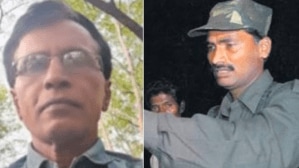She had the game, but gave much more
They named the biggest tennis stadium in the country after Arthur Ashe, retired numbers across baseball for Jackie Robinson. And all the whi...

They named the biggest tennis stadium in the country after Arthur Ashe, retired numbers across baseball for Jackie Robinson. And all the while, Althea Gibson watched it from her television set in a small garden apartment in New Jersey, not quite forgotten but not quite remembered either.
It was a strange place for a woman who had done more to shape the current look of tennis than anyone else. There would be no Venus and Serena Williams had Gibson not torn apart the color barrier nearly a half-century before, and yet when Gibson died yesterday, at 76, neither sister had ever met her.
‘‘The last time I saw her, we were driving away, and my boyfriend said, ‘Even you don’t realize what an icon she is. We all take it for granted, the (woman) lying in that apartment is one of our national heroes,’ ’’ said Zina Garrison, one of the few in Gibson’s inner circle. ‘‘And I knew that it was true.’’
Gibson’s relative obscurity was not for lack of accomplishment. Long before Ashe stepped on a blade of grass at the All-England club, it was Gibson who in 1950 became the first African American to play the US Championships, the precursor to the US Open. It was Gibson who won Wimbledon — twice in singles — as well as major titles in the US and France.
It was Gibson who, after retiring from tennis, became the first African American on the LPGA Tour. Along the way, she also played basketball, recorded a couple of albums. ‘‘She was just amazing to watch, she was literally stunning in her power and talent,’’ said Angela Buxton, who won a Wimbledon doubles title with Gibson in 1956. ‘‘And she was a lot of fun. We had a lot of very good laughs.’’
But while Gibson was a towering force through much of the middle of the century, she had been more of a recluse in recent decades, her body ravaged by illnesses. Only a select few were allowed to speak to her. Billie Jean King, once a close friend, spoke a few years ago of having to ‘‘negotiate’’ with Gibson just to secure a visit. Eventually, many gave up, and Gibson faded from the public consciousness.
For many, Gibson, born in a sharecropper’s shack in South Carolina and raised in Harlem, became emblematic of all that was possible. They poured into the streets for her after she first won Wimbledon, giving her a parade in Harlem that rivaled any ticker-tape extravaganza ever held on Wall Street. They cheered when she won it again, those raising their voices including a young Ashe, who could finally see someone who looked like him triumph at the highest level.
Garrison had been planning a tribute to Gibson, which she still hopes to hold sometime in the next year. ‘‘We’re still going to do it, because it’s needed,’’ Garrison said. ‘‘I just wish we could have done it while she was still here. I wanted her to know how much people loved her. I didn’t want her to leave thinking people had forgotten about her.’’ (LA Times-Washington Post)






- 01
- 02
- 03
- 04
- 05

























